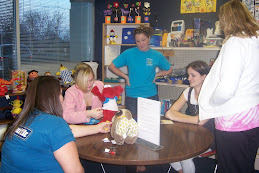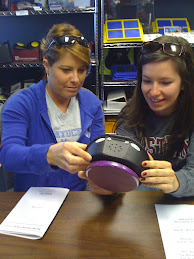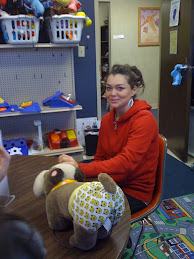1/22/09
A Quick Question
First I would like to send out my prayers for Jenny and her family also to Mrs. White that she feels better soon. I have a current student who really struggles to remain in their seat and stay on task, especially since they are a low level reader. Does anyone know any good reading games that also involve being up and active. Any help would be appreciated. Thanks
Subscribe to:
Post Comments (Atom)






Eric,
ReplyDeleteThanks for your prayers. I am feeling somewhat better today although I didn't go to my full time job even today. Hoping to be able to go tomorrow.
How old is the student? What type of tasks is the student being presented? What support or accommodations are provided to the child to accomplish the task if there is a disconnect between the level of the task and the child's ability level? Could the content be provided to the child in a different way? Could the child demonstrate the knowledge in a different way? How often is the child given the opportunity to move around? Has any type of structured plan been developed to monitor in seat/out of seat behavior or movement - if this is the real issue? Could the child "stay in their seat" if they were doing reading activities or work on their level if the reading activity was on a computer?
Is the "real" issue (in your opinion) 1. behavior, 2. ability to stay in seat (physical issue - attention, movement), 3. more about the disconnect between the child's ability and the level of the work - thus creating a behavior issue perhaps?
All of these are questions I would need to know before I would even begin to offer any ideas.
The child is 14 years old but performs on a much lower level. We've tried lots of different techniques from flash cards to lay overs to games like hang man on the board. In our classroom we us a point system to recieve rewards in which the students suggest. For every 20 minutes of work the student receives 10 minutes of free time, to do as they please. This student seems to become so frustrated only a few minutes in to a reading assignment that I can't even really get started with instruction. In the past this has been a major issue for this student. Previous instructors have ran into this same problem, My worry is that the child is already 14 yrs old and at this point they only have a few years of school left.
ReplyDeleteOften times students who are not "on task" or are disengaged are such for very specific reasons. I would encourage to get to the "root cause" for this student.
ReplyDeleteIf students in my classes when I am teaching elementary, middle or college are not engaged in the task then I accept that as MY responsibility and make it a matter of INSTRUCTION, the curriculum and my teaching methods - not the child's behavior. I ask myself what am I doing to ensure that I am engaging the student with
1. RELEVANT instruction that
2. is on THE CHILD'S level and yet is
3. RIGOROUS and CHALLENGING
How am I providing accomodations or support so that the child CAN BE SUCCESSFUL? I can't answer these questions becaue I don't know the child or the material. But are the flashcards and hangman games engaging and challenging work for a 14 year old?
Are those activities that other 14 year olds are doing? We will talk about in this class a variety of ways through accommocations (you can skip to those chapters or weeks on Blackboard and look at those websites) you can provide the SAME CONTENT other 14 year olds are covering but through other delivery methods. SAME EXPECTATIONS FOR ALL 14 year olds - different methods of providing access to that curriculum if the child has a reading disability.
Lots of GREAT ISSUES AND IDEAS here that we'll address over this semester.
Getting to the "root cause" may also lead you to the fact that this student does have other serious behavior issues that need to be addressed. Digging through both instructional issues - determining what is it in the Program of Studies and Core Content that the student is to be learning - what are the learning targets on a weekly/daily basis or what IEP goals you are targeting is one path to follow. However, digging to uncover if there are emotional and behavioral issues that are leading to this is also critical.
ReplyDeleteOur work with students who are labeled LBD is complex. Learning WHO they are and how to best meet their needs is a great challenge. This is why getting to that ROOT CAUSE is so critical in addressing their REAL needs so that they can learn to their fullest potential. It is THRILLING to see the amazing things they are able to do when together teacher and student discover the RIGHT key that unlocks the many mysteries and truly begins to help them make sense of all of the frustration many of them have felt for so long.
If you have not read the book, Thank You, Mr. Faulkner, I'd encourage you to get it and read it. We'll read it the week we look at LD and EBD students. It's written by a lady who has dyslexia.
Mrs. White
Eric,
ReplyDeleteI don't have much advice for you, but I do have an interesting site that may help you better understand the child's mindset. I do not have much background in this, but it could always help to better understand the problems a child is facing. I hope it helps a little.
http://www.pbs.org/wgbh/misunderstoodminds/
Brittany
Thanks very much for all the feed back, these issues are often reoccuring. The website had some good ideas for many things.
ReplyDelete